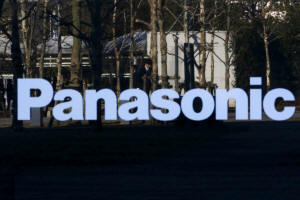|
The
company, whose energy unit makes batteries for Tesla Inc, seeks
to boost its auto battery capacity to 200 gigawatt hours per
year by March 2031, about four times its level at the end of
March, it said in a presentation on its website.
Panasonic plans to build at least two new factories for 4680
battery production in North America by 2030, a spokesperson
confirmed to Reuters.
Panasonic has yet to decide where in North America it will add
the production capacity, said the company's Group Chief
Executive Officer Yuki Kusumi.
"It could be Nevada, it could be Kansas or it could be somewhere
else," Kusumi said during a press conference after giving a
presentation about the company's strategy.
Panasonic and trading house Marubeni Corp will build out a
delivery network in Japan that will use small electric vans, the
Nikkei newspaper said later on Thursday.
The firms will form a joint venture around June that will be
tasked with issues ranging from installing charging units to
managing vehicle batteries, Nikkei said, adding they will deploy
hundreds of EV commercial vans in about two years.
Panasonic and Marubeni declined to comment on the report.
Panasonic is running a pilot 4680 production line at its
Wakayama factory in Japan, while Tesla is already producing the
4680 battery cells, which Tesla CEO Elon Musk has touted as
being key to making cheaper and compelling electric cars.
Panasonic will also set up two other new sites to deepen its
battery know-how in Japan over the next two years.
One is a production technology facility it will establish in
Osaka city in 2024, and the other is a site for development of
new and next-generation batteries that it plans to set up in
2025 in neighbouring Kadoma city.
(Reporting by Daniel Leussink; Editing by Jacqueline Wong and
Christina Fincher)
[© 2023 Thomson Reuters. All rights
reserved.]
This material may not be published,
broadcast, rewritten or redistributed.
Thompson Reuters is solely responsible for this content.

|
|




